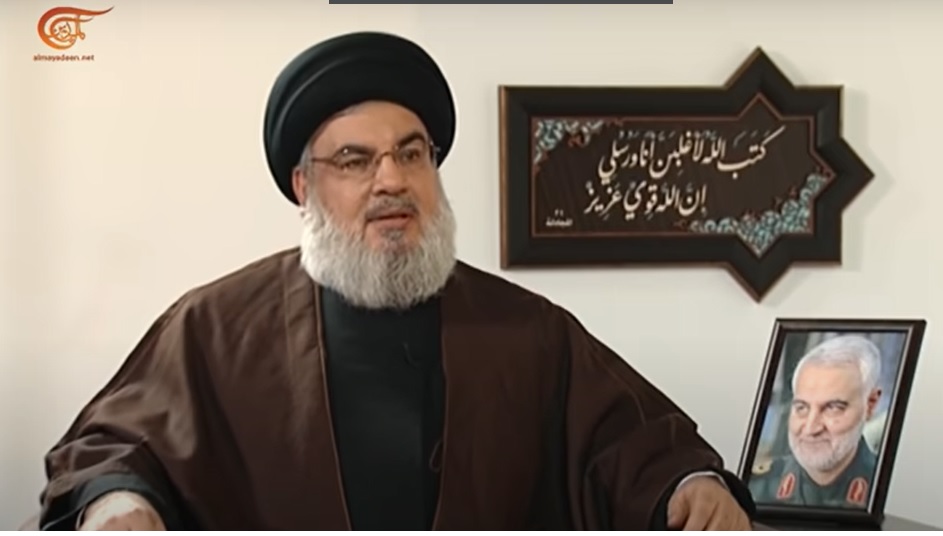Encouraged by Iran, Hassan Nasrallah deliberately escalates tensions on the Israeli border, engaging in provocations aimed at humiliating Israel, undermining its self-confidence, and forcing it to maintain a policy of containment.
Recent incidents, such as the firing of an anti-tank missile at Israel, the establishment of two Hezbollah tents on Israeli territory, and ongoing provocations along the border fence, indicate that Hezbollah has become more audacious and ready to challenge Israel compared to the Second Lebanon War.
A military conflict between the two seems increasingly likely.
While Israel currently prioritizes containment over a military operation against Hezbollah, this approach is often interpreted as weakness, which Hezbollah exploits to exert additional pressure on Israel.
Hassan Nasrallah is displaying signs of recovery from the trauma of the Second Lebanon War. Despite remaining in hiding, he estimates that Israel’s internal political crisis, including the judicial reform and the confrontation between Prime Minister Netanyahu and President Biden, are tying Israel’s hands and granting Hezbollah freedom of action on the border that it previously lacked.
Due to past incidents, such as Hezbollah’s infiltration of a terrorist into Israeli territory who detonated an explosive device at the Megiddo junction, Israel has a long-standing grievance with the organization.
However, Israel refrained from responding to that incident, inadvertently encouraging further provocations from Hezbollah.
Currently, Hassan Nasrallah is making additional demands of Israel, including the return of the northern part of the village of Rajar to Lebanese sovereignty and the cessation of border fence construction.
The latter disrupts Hezbollah’s plans to introduce the “Radwan” force, comprising several thousand fighters, into Israeli territory during a war, with the intent to occupy parts of the Galilee and abduct Israeli soldiers and civilians.
Hezbollah is deliberately escalating tensions in response to the border fence construction and the 13 points of contention between Israel and Lebanon along the “blue line,” the UN-defined separation between the two countries.
Israel must not acquiesce to Hezbollah’s demands. The construction of the new border fence is a crucial security project for defending the Galilee and must continue, despite Hezbollah’s attempts to disrupt the works.
The Israeli Defense Forces (IDF) should diligently fortify vulnerable points along the Lebanese border, making it difficult for Hezbollah to penetrate Israeli territory during times of war.
If anything, Israel should expedite the construction of the fence.
Hassan Nasrallah has shifted from using threats to employing force to achieve his goals.
This change was evident last year when he launched four drones at the “Karish” gas rig during negotiations on the maritime border.
Now, he is resorting to similar tactics to pursue his demands regarding the land border with Israel.
Nasrallah has also allowed the Hamas movement to operate in southern Lebanon and launch rockets towards Israel, as witnessed during the last month of Ramadan.
Nasrallah’s strategy not only aims to erode Israel’s deterrence but also serves internal purposes.
It strengthens his image within Lebanon, a country grappling with severe economic and political crises, portraying him as the “protector of Lebanon.”
He has faced numerous challenges in appointing his associate Suleiman Faranjia to the position of President of Lebanon.
The United States is attempting to prevent escalation, and President Biden has dispatched special envoy Amos Hochstein to mediate between Israel and Lebanon regarding the maritime border.
However, the effectiveness of American mediation remains uncertain, given that Nasrallah is confident in his position and expects to have the upper hand once again.
Hezbollah continues to undermine Israel’s deterrence, seemingly unfazed by IDF operations against the Islamic Jihad in the Gaza Strip or the operations in the Jenin refugee camp.
Consequently, Israel will likely need to take broader military action to deter Hassan Nasrallah.
A surprising preemptive strike on Hezbollah in Lebanon, even if it results in several days of fighting, such as targeting Hezbollah’s secret precision missile project production and launch sites, which are well-known to the IDF, is necessary.
Israel must teach Hezbollah a lesson and exact a heavy price for all its provocations, including the attack at the Megiddo junction.
Covert operations conducted by the Israeli Mossad within Lebanon itself can also be considered, although it is preferable to act openly in order to restore deterrence and make Hassan Nasrallah regret his actions.
Israel should also hold Lebanon accountable for cooperating with Nasrallah’s new strategy.




